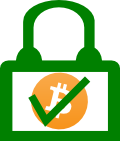Don't Bank On Digital Currency 'Bitcoin' Replacing The Dollar

Imagine a world where your credit card is a distant memory, where all of your accounts are stored in your phone instead of a bank, and where everyone pays for their purchases with a new global currency that was designed exclusively for the digital age. According to the developers of Bitcoin, this future is no fantasy. Over the past few years, the peer-to-peer currency they’ve created has gained a surprising foothold in the global market. There are now multiple Bitcoin processing apps for Android and the iPhone as well as an online payment system similar to PayPal. At least one Forbes columnist seems to applaud Bitcoin’s separation of money from the state. But does the ambitious new project really have what it takes to change the world? Its fun to hope so, but don’t bank on it. Here’s why. For small businesses, Bitcoin seems like the solution to household credit card woes. Instead of enabling merchants to process credit card payments from Visa or MasterCard, Bitcoin bypasses the system entirely in favor of device-to-device transactions using near-field communications technology. Bitcoin’s new currency doesn’t require a third-party processor or a plug-in dongle. Because of this, Bitcoin can afford to charge users much less per transaction. At the moment, the average Bitcoin transaction fee is .99%, while Square and PayPal’s processing apps charge 2.75% and 2.7% per swipe of your credit card. Like any currency, bitcoins can also be exchanged for U.S. dollars through a processing service. The current rate is $4.904 per 1 bitcoin. But that’s not saying it has to be exchanged in order to be successful. In Africa, where inflation is out of control, many merchants are choosing to hang onto their bitcoins so that they don’t have to push around wheelbarrows full of $100 trillion notes. Additionally, Bitcoin is poised to take over the black market, and for the obvious reason: it offers shady merchants a way to earn their living completely off the government radar. So what’s holding Bitcoin back from shaking up the global economy? Well, security for starters. Unlike your credit card, Bitcoin currently provides no protection or compensation in the event of fraud. Recently, a hacker managed to raid several Bitcoin “bank” accounts – the credit and debit accounts of “rich” Bitcoin users – around the world and got away with $228,845. Now that money is gone. In theory, security analysts should be able to trace IP activity while the raids happen, thereby snaring the thieves. But masking programs have enabled this particular thief to remain anonymous so far. It’s not just safety that has us concerned about Bitcoin, though. We’re also skeptical about how “decentralized” this digital currency can really be. Though the official wiki claims that the protocol is now mandated by community consensus, it’s impossible to ignore the power that the original developers have over the system. They have a skeleton key that gives them control of the whole machine, any time they want. Additionally, there’s the problem of balancing the economy. In the U.S., the Federal Reserve handles the printing and regulation of the dollar. If the bitcoin is to become a widely accepted global currency, a regulating agency more complex and thorough than the Fed is required. From the looks of it, there isn’t one yet. In fact, the market price for Bitcoin has been plummeting since 2011. All this adds up to a currency that, while undeniably innovative, has too many flaws to make a lasting impact on the global economy. It’s easy to see how Bitcoin might remain a fixture on the black market and within the larger shadow economy for years to come. But as for your mobile phone? You might as well pass now and save yourself the trouble. Visa and MasterCard are still going to hold the reigns for a while. |



 网友评论
网友评论


 @好耶网络
Processed In:-1.3594-Seconds, CMS-40Queries-Amazon Web Services
@好耶网络
Processed In:-1.3594-Seconds, CMS-40Queries-Amazon Web Services












 您的位置:
您的位置: 【】
【】

 [上两篇]
[上两篇]